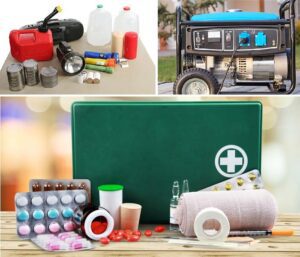 The weather watch is on Ian, and based on the latest projected track and overall forecast, OUC is preparing for potential impacts to the Orlando service area. OUC said they will be ready to respond, but asked residents to gather supplies and keep track of the storm.
The weather watch is on Ian, and based on the latest projected track and overall forecast, OUC is preparing for potential impacts to the Orlando service area. OUC said they will be ready to respond, but asked residents to gather supplies and keep track of the storm.
When facing a hurricane, the last thing you want to encounter is illness or injury. But by putting together a hurricane safety preparation kit, you can be ready. OUC recommends including the following first-aid kit this hurricane season:
- First-aid manual.
- Sterile adhesive bandages in assorted sizes.
- Assorted sizes of safety pins.
- Cleansing agent/soap.
- Latex gloves (2 pairs).
- Sunscreen.
- Sterile gauze pads (4-6) and triangular bandages (3).
- Nonprescription drugs, such as ibuprofen, aspirin or acetaminophen and an antihistamine for allergic reactions or as a sleep aid.
- Sterile roller bandages for minor sprains (3 rolls).
- Scissors, tweezers and needle.
- Moistened towelettes.
- Antiseptic.
- Thermometer.
- Tongue depressors (2).
- Tube of petroleum jelly or other lubricant.
- Anti-diarrhea medication.
- Antacid (for stomach upset).
- Syrup of ipecac (use to induce vomiting if advised by the Poison Control Center).
- Laxative.
- Activated charcoal (use if advised by the poison control center).
- Vitamins.
- Add any necessary prescription and nonprescription drugs and any special needs for infants, elderly persons, or anyone with serious allergies.
Generators can be useful tools during an outage – but keep these hurricane safety tips in mind if you choose to use one:
- Select a Safe Spot. Never run a generator in an enclosed space or indoors. Most generator-related injuries and deaths involve carbon monoxide poisoning that can build up. Always place a generator at least 20 feet from your house — and never in an attached garage — with the engine exhaust pointed away from windows and doors.
- Never plug a generator directly into your home’s outlets because it could re-energize power lines. This could endanger the lives of your neighbors who may be served by the same transformer and tree-trimming and utility crews working to restore power in your area.
- Install a transfer switch before a storm hits. This connection costs between $500 to $900, including labor, for a 5,000-rated-watt or larger generator. A transfer switch connects the generator to your circuit panel and lets you power hardwired appliances while avoiding the glaring safety risk of using extension cords. Most transfer switches also help you avoid overload by displaying wattage usage levels.
- Obey all local, state and national electrical and fire codes. You may not be aware, but it’s against the law and a violation of electrical codes to connect generators to your home’s electrical circuits without approved automatic-interrupt devices.
- Do not run a portable generator in rainy or wet conditions.
- Before refueling, turn off a gas-powered generator and let it cool. Any fuel spilled onto a hot surface could ignite. And a cool generator decreases the risk of burns while refueling.
- Always read the instructions carefully. Consult a licensed electrician if you have questions or concerns.
- Keep children and pets away from generators.
- Always keep a fully charged fire extinguisher nearby.
The National Hurricane Center forecasts Ian to strengthen to a Category 3 hurricane, possibly reaching a Category 4 at some point, and impact Florida later in the week.
Check this OUC guide for more information on hurricane safety before, during and after a storm.
RELATED: Here Comes Hurricane Ian: Orange County Information & Preparation


